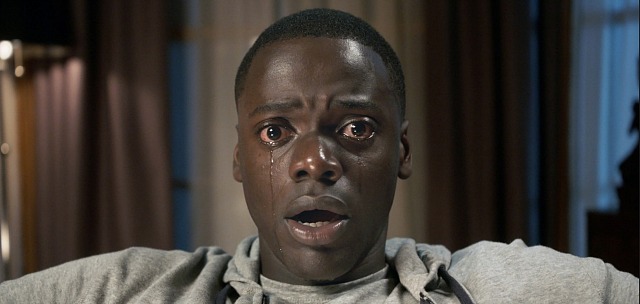The flagrantly political instinct to over-praise and over-celebrate Get Out — one of the most confounding and surreal episodes of mass derangement in any award season in memory — has caught fire among regional critics groups. Slightly less than a third of 33 regional critics groups have handed Jordan Peele‘s horror-satire their Best Picture prize.
The lemmings are leaping off the cliff, you bet, and for reasons that don’t really make sense to people who haven’t been affected by the “woke” virus, first and foremost being that Get Out is a popular, audience-rousing genre film that doesn’t begin to show exceptional chops or deliver “greatness” by any time-honored standard.

We’re talking about some kind of mind virus, propelled online and delivered through smartphones — a mass decision by younger Academy voters and the identity-politics crowd to radically up-end Best Picture criteria by supporting a film that no sane critic or prognosticator would have gotten behind ten or even five years ago.
“If you’re looking for more reasons to deplore the Get Out pack, the film was just named Best Picture, and Jordan Peele best director and screenwriter, by the North Carolina Film Critics Association, of which I am a member,” a friend just wrote me.
“I am with you on the whole Get Out issue. A good film but not even close to being a great one, advanced by p.c. critics. As my grandmom would say, ‘Feh!'”
For sensible-minded regional critics, this reality-defying, Wayne Fontana and Mindbenders movement is partly about regional wokers wanting to demonstrate solidarity with big-city brethren (“We get it, guys…we’re with you in spirit”).
The Get Out-ers are massing under a political conviction that never enjoyed overwhelming currency during the Obama or Dubya administrations, but which, in today’s highly charged political climate (and especially within ardent liberal circles), is absolutely paramount in their eyes: Best Picture awards should no longer go to the best or boldest or most affecting artistic achievement but to films that (a) are most deserving of Hollywood’s political-social merit badge award, and (b) reflect favorably on the critics’ own progressive convictions.
As I wrote a couple of days ago, the “Get Out deserves to win Best Picture” thing is mainly about (a) extending the #OscarsSoWhite guilt complex by supporting a politically “woke” film, (b) industry POCs doing their usual identity-politics bonding and (c) GenX and Millenial coolios wanting to crown a horror-satire genre film for generational-solidarity reasons (“We’re the new crowd and we have different standards for Best Picture achievement!”) as well as sheer perversity’s sake, largely because Get Out doesn’t begin to exude Best Picture criteria. And guess what else? If you describe this mindset as bizarre or deranged or question the Get Out rally-rounders, you’re suddenly suspected of unsavory social views. You might have friends who marched in Greensboro. Do you see what the wokers are up to? “Are you now or have you ever been a person who didn’t celebrate Get Out for the right reasons or, worse, put it down for the wrong reasons?”
On the other hand, according to Variety‘s Kris Tapley: “What’s striking about this year’s race is that 11 different pictures have received best-film recognition so far. When all was said and done last year, only six films had been singled out (with La La Land and Moonlight neck and neck — all the way to the finish line and beyond, it would turn out).
“Other movies to be named the year’s best by national and international critics groups include Call Me by Your Name, Dunkirk, The Florida Project, A Ghost Story, Lady Bird, Mudbound, Phantom Thread, The Post and Three Billboards Outside Ebbing, Missouri. That spread buttresses the notion that this has been one of the most exciting best-picture Oscar races on record.”












